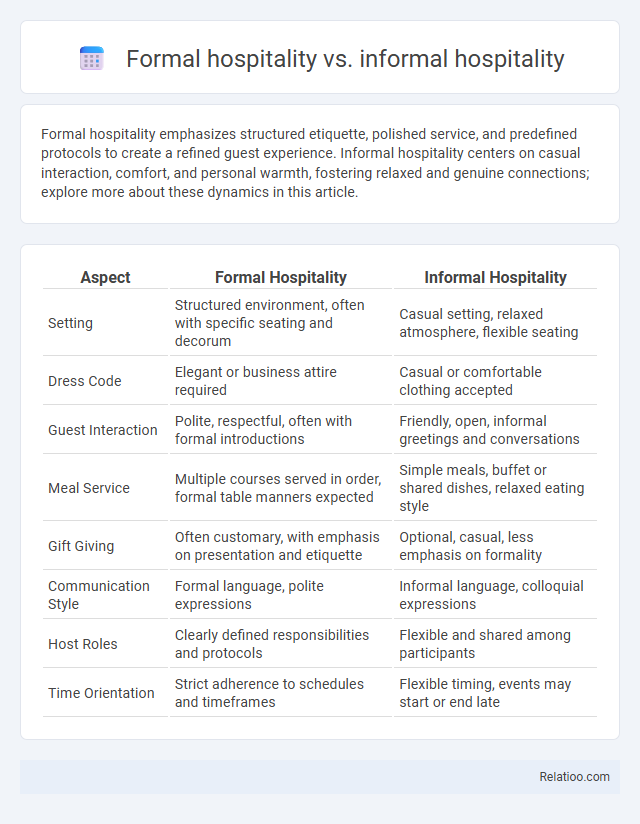Formal hospitality emphasizes structured etiquette, polished service, and predefined protocols to create a refined guest experience. Informal hospitality centers on casual interaction, comfort, and personal warmth, fostering relaxed and genuine connections; explore more about these dynamics in this article.
Table of Comparison
| Aspect | Formal Hospitality | Informal Hospitality |
|---|---|---|
| Setting | Structured environment, often with specific seating and decorum | Casual setting, relaxed atmosphere, flexible seating |
| Dress Code | Elegant or business attire required | Casual or comfortable clothing accepted |
| Guest Interaction | Polite, respectful, often with formal introductions | Friendly, open, informal greetings and conversations |
| Meal Service | Multiple courses served in order, formal table manners expected | Simple meals, buffet or shared dishes, relaxed eating style |
| Gift Giving | Often customary, with emphasis on presentation and etiquette | Optional, casual, less emphasis on formality |
| Communication Style | Formal language, polite expressions | Informal language, colloquial expressions |
| Host Roles | Clearly defined responsibilities and protocols | Flexible and shared among participants |
| Time Orientation | Strict adherence to schedules and timeframes | Flexible timing, events may start or end late |
Defining Formal and Informal Hospitality
Formal hospitality involves structured, official settings with specific protocols and etiquette, such as business dinners or ceremonial events. Informal hospitality is characterized by casual, relaxed interactions typically among friends or family without strict rules or schedules. Understanding the distinction helps you navigate social expectations and tailor your hospitality to fit the occasion appropriately.
Key Characteristics of Formal Hospitality
Formal hospitality involves structured, etiquette-driven settings with attention to detail, such as precise table arrangements, specific dress codes, and planned menus. Informal hospitality is more relaxed and spontaneous, prioritizing comfort and casual interactions without strict protocols. Your experience in formal hospitality ensures a polished atmosphere through refined service standards, clear roles, and an emphasis on tradition and professionalism.
Essential Elements of Informal Hospitality
Informal hospitality centers on genuine warmth, personal connection, and comfort, distinguishing it from the structured protocols of formal hospitality and the duty-bound nature of hospitality obligation. Essential elements include spontaneity, relaxed attitudes, and an emphasis on creating a welcoming atmosphere without rigid expectations or formalities. This approach fosters sincere interactions and flexible guest experiences, prioritizing emotional comfort over standardized procedures.
Settings and Venues: Formal vs Informal Experiences
Formal hospitality typically occurs in structured settings such as banquet halls, upscale restaurants, or corporate events, emphasizing etiquette, dress codes, and attention to detail. Informal hospitality takes place in casual venues like homes, cafes, or small gatherings, allowing relaxed interactions and spontaneous experiences. Understanding your preferences and the nature of the event helps determine whether a formal or informal hospitality setting best suits your occasion and expectations.
Guest Expectations and Etiquette
Formal hospitality emphasizes structured guest expectations with a clear hierarchy of etiquette, including dress codes, scheduled activities, and refined table manners. Informal hospitality allows for relaxed guest interactions, where comfort and personal connection take precedence over strict protocols, fostering a casual and flexible environment. Hospitality obligation stresses the ethical and cultural duty to welcome guests respectfully, often prioritizing generosity and attentiveness regardless of formality or setting.
Types of Events: Formal and Informal Occasions
Formal hospitality typically involves structured events such as weddings, corporate galas, and official ceremonies where etiquette and protocol are strictly observed. Informal hospitality suits casual gatherings like family get-togethers, birthday parties, or friendly meet-ups, emphasizing comfort and personal connection. Your choice between these types depends on the nature of the event and the expected level of social obligation, balancing formality with genuine warmth.
Service Styles: Structured vs. Casual Approaches
Formal hospitality emphasizes structured service styles with precise etiquette, multiple courses, and professional presentation, creating an elegant and refined experience. Informal hospitality adopts casual approaches, encouraging relaxed interaction and flexibility in serving, often featuring buffet or family-style dining to foster comfort and spontaneity. Your choice between these styles influences the atmosphere and guest expectations, balancing tradition against personal warmth and ease.
Pros and Cons of Formal Hospitality
Formal hospitality offers a structured and elegant experience, enhancing your guests' comfort with polished etiquette and refined service, yet it can be costly and demanding in preparation. This style promotes professionalism and clear expectations, but may feel rigid or less personal compared to informal hospitality. Balancing formality ensures your event maintains decorum without sacrificing warmth or spontaneity.
Advantages and Challenges of Informal Hospitality
Informal hospitality offers advantages such as fostering genuine personal connections, flexibility in arrangements, and reduced pressure to adhere to strict etiquette, making guests feel more comfortable and welcomed. However, challenges include potential misunderstandings due to lack of clear expectations, difficulty in coordinating larger gatherings, and occasional discomfort arising from unfamiliar customs or behaviors. Unlike formal hospitality, which enforces structured protocols, informal hospitality relies heavily on personal rapport but may lack consistency in service quality and guest experience.
Choosing the Right Hospitality Style for Your Event
Choosing the right hospitality style for your event depends on the desired atmosphere and guest expectations, where formal hospitality involves structured settings with professional service and precise etiquette. Informal hospitality offers a relaxed environment with casual interactions and flexible arrangements, suitable for friendly gatherings. Hospitality obligation emphasizes cultural or social duties to host, often requiring adherence to traditional norms and generosity to ensure guests feel respected and welcomed.

Infographic: Formal hospitality vs Informal hospitality
 relatioo.com
relatioo.com